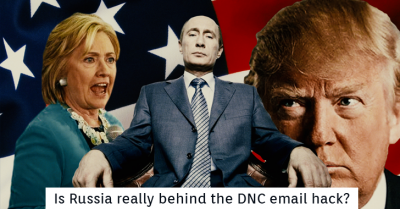What We Don’t Talk About When We Talk About “Russian Hacking”

American politics have rarely presented a more disheartening spectacle. The repellent and dangerous antics of Donald Trump are troubling enough, but so is the Democratic Party leadership’s failure to take in the significance of the 2016 election campaign. Bernie Sanders’s challenge to Hillary Clinton, combined with Trump’s triumph, revealed the breadth of popular anger at politics as usual – the blend of neoliberal domestic policy and interventionist foreign policy that constitutes consensus in Washington. Neoliberals celebrate market utility as the sole criterion of worth; interventionists exalt military adventure abroad as a means of fighting evil in order to secure global progress. Both agendas have proved calamitous for most Americans. Many registered their disaffection in 2016. Sanders is a social democrat and Trump a demagogic mountebank, but their campaigns underscored a widespread repudiation of the Washington consensus. For about a week after the election, pundits discussed the possibility of a more capacious Democratic strategy. It appeared that the party might learn something from Clinton’s defeat. Then everything changed.
A story that had circulated during the campaign without much effect resurfaced: it involved the charge that Russian operatives had hacked into the servers of the Democratic National Committee, revealing embarrassing emails that damaged Clinton’s chances. With stunning speed, a new centrist-liberal orthodoxy came into being, enveloping the major media and the bipartisan Washington establishment. This secular religion has attracted hordes of converts in the first year of the Trump presidency. In its capacity to exclude dissent, it is like no other formation of mass opinion in my adult life, though it recalls a few dim childhood memories of anti-communist hysteria during the early 1950s.
The centrepiece of the faith, based on the hacking charge, is the belief that Vladimir Putin orchestrated an attack on American democracy by ordering his minions to interfere in the election on behalf of Trump. The story became gospel with breathtaking suddenness and completeness. Doubters are perceived as heretics and as apologists for Trump and Putin, the evil twins and co-conspirators behind this attack on American democracy. Responsibility for the absence of debate lies in large part with the major media outlets. Their uncritical embrace and endless repetition of the Russian hack story have made it seem a fait accompli in the public mind. It is hard to estimate popular belief in this new orthodoxy, but it does not seem to be merely a creed of Washington insiders. If you question the received narrative in casual conversations, you run the risk of provoking blank stares or overt hostility – even from old friends. This has all been baffling and troubling to me; there have been moments when pop-culture fantasies (body snatchers, Kool-Aid) have come to mind.
Like any orthodoxy worth its salt, the religion of the Russian hack depends not on evidence but on ex cathedra pronouncements on the part of authoritative institutions and their overlords. Its scriptural foundation is a confused and largely fact-free ‘assessment’ produced last January by a small number of ‘hand-picked’ analysts – as James Clapper, the director of National Intelligence, described them – from the CIA, the FBI and the NSA. The claims of the last were made with only ‘moderate’ confidence. The label Intelligence Community Assessment creates a misleading impression of unanimity, given that only three of the 16 US intelligence agencies contributed to the report. And indeed the assessment itself contained this crucial admission: ‘Judgments are not intended to imply that we have proof that shows something to be a fact. Assessments are based on collected information, which is often incomplete or fragmentary, as well as logic, argumentation and precedents.’ Yet the assessment has passed into the media imagination as if it were unassailable fact, allowing journalists to assume what has yet to be proved. In doing so they serve as mouthpieces for the intelligence agencies, or at least for those ‘hand-picked’ analysts.
It is not the first time the intelligence agencies have played this role. When I hear the Intelligence Community Assessment cited as a reliable source, I always recall the part played by the New York Times in legitimating CIA reports of the threat posed by Saddam Hussein’s putative weapons of mass destruction, not to mention the long history of disinformation (a.k.a. ‘fake news’) as a tactic for advancing one administration or another’s political agenda. Once again, the established press is legitimating pronouncements made by the Church Fathers of the national security state. Clapper is among the most vigorous of these. He perjured himself before Congress in 2013, when he denied that the NSA had ‘wittingly’ spied on Americans – a lie for which he has never been held to account. In May 2017, he told NBC’s Chuck Todd that the Russians were highly likely to have colluded with Trump’s campaign because they are ‘almost genetically driven to co-opt, penetrate, gain favour, whatever, which is a typical Russian technique’. The current orthodoxy exempts the Church Fathers from standards imposed on ordinary people, and condemns Russians – above all Putin – as uniquely, ‘almost genetically’ diabolical.
To read complete article on London Review of Book click here
Featured image is from The Hacker News.


